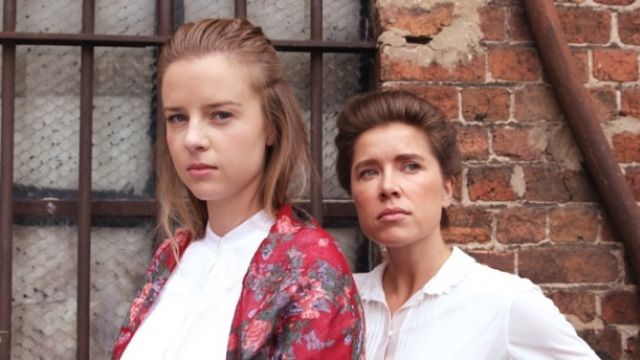Flash Donahs
Flash Donahs is ‘documentary theatre’ set in Melbourne in the 1880s. That is, it is based on factual research and made up of real newspaper articles, court transcripts, political speeches and, in this case, Salvation Army records. It is knitted together with interludes of imagined dialogue. In other words, as with any adaptation from factual material, the writer has the public record, but they must create the private interactions in such a way that the latter meshes with the former. A ‘donah’, by the way, is archaic slang for a woman, a girl or, sometimes, a sweetheart.
As writer-director Graeme Dale says in his program note, he’s attempted ‘to show what it may have been like to be a young larrikin woman living in Melbourne during a period of great social and economic change… The characters… [are] all real people…’. Clearly, Mr Dale has done some extensive and painstaking research, not just into words but into images: his play is illustrated with slides of 1880s people and buildings. The project is the basis of his PhD by Creative Project at Victoria University.
It is all too easy, however, in such an enterprise, to drown in research and include too much ‘illustration’ or what seems ‘interesting’ to the researcher at the expense of drama. There is a slim narrative thread through Flash Donahs: the decline and fall of spirited donah Cecilia Anthony, played by Harriet Robertson. The imagined scenes between Cecilia and her friend Bessie (Genevieve Neve) are the liveliest in the piece. Would that there was more of this focus – and less ‘history’.
The cast of four women between them play twenty-three characters, female and male – although I would not know this without the program’s list of characters. Anna Ellis plays ten (!) characters, Isabelle Jenkins three, Ms Neave four and Ms Robertson six. Their characters may well all be ‘real’ people, but their number, a lack of clear difference (despite costume changes) among them and rather less than adequate acting confuse the audience. Cecilia’s story gets buried and it all makes the play’s running time (just under 90 minutes) seem interminable. The already limited narrative drive is weakened by there being simply too many short scenes that lack dramatic development or point. Then they are divided by the hiatus of blackouts during which the cast carry on and take off pieces of furniture.
Despite the help and support Mr Dale has received and his undoubted sincerity, Flash Donahs really does not work as drama, as theatre. What could have been a moving piece – or even an agit-prop piece – about how those ‘social and economic changes’ crushed a young woman until she is a broken beggar on the streets, gets muddied and lost under the burden of too many characters, too much information and unfortunately poor stagecraft.
Michael Brindley
Subscribe to our E-Newsletter, buy our latest print edition or find a Performing Arts book at Book Nook.

